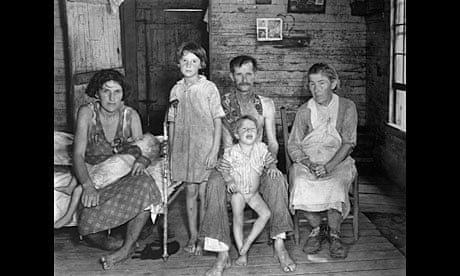Now that the IMF has taken control of Ireland, it seems that traditional poverty is back in fashion. House repossessions are up, consumer spending is down, and unemployment is running at levels not seen for a quarter of a century or more. The whole thing has come as quite a shock for many people, but for poets, a lack of cash is nothing new; poverty is one of the great recurrent poetic themes.
So how do you recognise poverty when it hits you? Maybe it's when you can't afford diesel for the SUV, or when you realise that you can only stump up for one foreign holiday this year. Could it be the day when your Internet provider bill remains unpaid? Or perhaps you know you're poor when, like Hayden Carruthin in his poem "Notes on Poverty", you find that you're stealing cattle fodder to grind into flour. Now that's hardship.
Ideally, if you find yourself poor, you'd like to work your way out of it. What better way than to get a good education and qualify for a profession like teaching? As a means of escaping an impoverished background it sounds straightforward enough, and many parents sacrifice what little they have to try to ensure a better future for their children by educating them whatever the cost. Sadly, as Charles Reznikoff demonstrates in his poem beginning "His father carved umbrella handles", the results are not always what we hope for.
Reznikoff's friend George Oppen takes a more optimistic view when he writes "'out of poverty / to begin // again'". Mind you, despite the fact that Oppen spent much of his life in fairly straitened circumstances, the poverty in this poem seems more symbolic than actual. A third friend and fellow Objectivist, William Carlos Williams, takes a much more positive view. His Poor Old Woman is caught in a moment of plum-induced pleasure; despite her poverty, the fruit, and life itself, tastes good.
The Japanese monk Chomei in Basil Bunting's "Chomei at Toyam"a is quite different to Williams's woman. He has, to an extent, chosen poverty and he can see its virtues, but he states quite frankly that he doesn't like it. In passing, he offers an observation which, had it been acted on, might have saved us in Ireland many of the hardships that lie ahead when he says "Men are fools to invest in real estate." How true; how very true.
What Chomei fails to mention is the role of the banks in your typical property bubble and burst; poets are generally not supposed to dirty their hands with that kind of stuff. However, Bunting's mentor Ezra Pound must have missed that day at Bardic school. Whatever you might think of his political views, there's no denying the power of the litany against usury that comprises Canto XLV.
Whether or not you blame the banks or the international money markets for your poverty, you will almost certainly have to face a couple of its less pleasant side effects. The first of these is the condescension of those do-gooders who claim to have your best interests at heart. These Lovers of the Poor, members of the Ladies' Betterment League, are displayed in all their hypocritical glory by Gwendolyn Brooks.
The second consequence of poverty that I have in mind is the discovery that there is, quite literally, one law for the rich and another for the poor. I can think of no better verse illustration of this sad state of affairs than Bob Dylan's song "The Lonesome Death of Hattie Carroll". The power of Dylan's lyric stems from the insistence that it is not Carroll's poverty or even her death at the hands of the wealthy William Zanzinger that should elicit our tears, but rather the fact that his money allows him to escape the consequences of his actions. If you're poor, you can expect no equality of treatment.
And so, this time around the call is for poems on the subject of poverty. You may choose to sing its simple pleasures or rail against injustice. Perhaps you want to analyse its causes or point the finger at those who should know better but are content to stand by while others go without. You might even feel that it's the fault of the poor themselves. One way or another, why not share your poems here? It might just make us all feel a little better off.

Comments (…)
Sign in or create your Guardian account to join the discussion